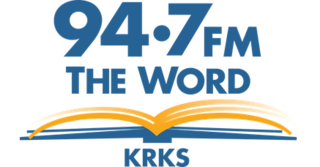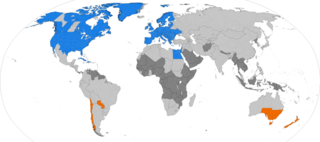
Low-power broadcasting refers to a broadcast station operating at a low electrical power to a smaller service area than "full power" stations within the same region, but often distinguished from "micropower broadcasting" and broadcast translators. LPAM, LPFM and LPTV are in various levels of use across the world, varying widely based on the laws and their enforcement.
WPEP was an AM radio station operating on a frequency of 1570 kHz from Taunton, Massachusetts. WPEP's format had been full-service, offering local news and talk programming, as well as music and nationally syndicated talk. The station was last owned by the Anastos Media Group.
WPBS is an commercial AM radio station licensed to the city of Conyers, Georgia. It broadcasts a Vietnamese language music and talk radio format for the Atlanta media market. The station is considered a Class D AM radio facility by the Federal Communications Commission, operating with 50,000 watts of power during the daytime, and 5,500 watts during critical hours using a non-directional antenna. The station must sign off after local sunset to avoid interference to WHO in Des Moines, Iowa which is a Class A clear channel station on the same frequency.

KFAX is a commercial AM radio station licensed to San Francisco, California, and heard around the Bay Area. As of 2014, the station is owned by Salem Media Group and programs a Christian radio teaching and talk format.
A public file is a collection of documents required by a broadcasting authority to be maintained by all broadcast stations under its jurisdiction.
WBHA is a radio station licensed to Wabasha, Minnesota and is owned by Q Media Group, LLC and airs a country music format.

KRKS is a commercial AM radio station licensed to Denver, Colorado. The station is owned and operated by Salem Communications and it airs a Christian talk and teaching radio format. Its studios and offices are located on South Vaughn Way in Aurora, and the transmitter is located on East 56th Avenue in North Washington. KRKS is simulcast with co-owned 94.7 KRKS-FM. Together, they are known as "94.7 The Word."

WMBI is a Class D AM radio station broadcasting on the clear-channel frequency of 1110 kHz in Chicago, Illinois. It is owned and operated by Moody Radio, and it broadcasts from the campus of Moody Bible Institute in Downtown Chicago, and Transmitter facilities and tower located in Addison, Illinois.
KLAT, branded as "Deportes Houston", is a commercial AM radio station in Houston, Texas. It is owned by Univision and airs a Spanish-language sports radio format. The station serves as the Spanish flagship radio station of the Houston Texans football team and also airs Houston Dynamo soccer games.
KYND is a commercial terrestrial radio station, licensed to the unincorporated Harris County community of Cypress, serving the Houston, Texas metropolitan area as a Class D daytime only operating facility. KYND is owned by Pro Broadcasting, Inc.; Bill Turner serves as KYND's General Manager.

KNZR is a news/talk radio station based in Bakersfield, California, United States. The station broadcasts with 25,000 watts of power daytime and 10,000 watts nighttime, and can be heard in most of California and other Western states at night. KNZR is designated by the FCC as a clear channel, Class A radio station. It is owned by Alpha Media, LLC, through licensee Alpha Media Licensee LLC. Its studios are located in Oildale, and its transmitter is located in southwest Bakersfield.
Critical hours for radio stations is the time from sunrise to two hours after sunrise, and from two hours before sunset until sunset, local time. During this time, certain American radio stations may be operating with reduced power as a result of Section 73.187 of the Federal Communications Commission's rules.

WHYL is a commercial AM radio station licensed to serve Carlisle, Pennsylvania. The station is owned by WHYL, Inc., and broadcasts an oldies music format.

WAFS, AM 1190, is radio station licensed to Atlanta, Georgia that broadcasts business news talk radio programming. The station transmits on a frequency of 1190 kHz, and is classified as a Class D AM broadcast station according to the Federal Communications Commission, with 25,000 watts of power during the daytime and 2,300 watts during critical hours using a non-directional antenna. WAFS also operates pre-sunrise (PSRA) with 350 watts and post-sunset (PSSA) with power levels from 54 to 150 watts.
WSON is a radio station in Henderson, Kentucky broadcasting a classic hits format. The station is currently owned by Henson Media and features news, sports, weather and music features programming from ABC Radio News and Westwood One, as well as locally produced programming. The station can be heard during daylight hours in neighboring Evansville, Indiana and Owensboro, Kentucky.

WSOS is a radio station which is broadcasting a classic hits format. Licensed to St. Augustine Beach, Florida, United States, the station serves the St. Augustine area. The station also re-broadcasts on translator W280EY 103.9 FM. The station is currently owned by Kevin Geddings through licensee WSOS Radio LLC of St. Augustine, Florida. WSOS AM 1170 is a daytime-only Class D station, broadcasting on the clear-channel frequency of 1170 AM. WSOS must leave the air from sunset to sunrise to avoid interference with the nighttime skywave signal of WWVA (AM) in Wheeling, West Virginia.
WXYB is a commercial AM radio station licensed to Indian Rocks Beach, Florida, and serving the Tampa Bay area. The station is currently owned by Angelatos Broadcasting.

KXEN is a commercial AM radio station licensed to St. Louis, Missouri, United States. The station is owned by BDJ Radio Enterprises, LLC. It carries a religious radio format, with most of the hours sold to national and local Christian radio hosts.













